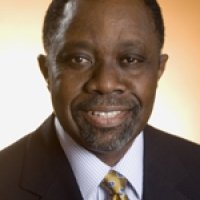Launch of the African Transformation Report 2017: Agriculture Powering Africa’s Economic Transformation
On October 19, 2017, the Wilson Center Africa Program hosted the launch of the African Transformation Report 2017, “Agriculture Powering Africa’s Economic Transformation,” with Dr. K.Y. Amoako, Founder and President of the African Center for Economic Transformation (ACET); Dr. Yaw Ansu, Chief Economist at ACET and primary author of the report; Dr. Mark Sundberg, Deputy Vice President and Chief Economist of the Millennium Challenge Corporation (MCC); and Dr. Xinshen Diao, Senior Research Fellow and the Deputy Director of the Development and Strategy and Governance Division of the International Food Policy Research Institute (IFPRI).
Dr. Amoako opened the event by providing context on the conceptualization of ACET – a pan-African think-tank that works to promote Africa’s transformation. Dr. Amoako provided background on the flagship African Transformation Report 2017, ACET’s second transformation report. He noted that the first report (2014) focused on Africa’s pathways to transformation, and this second report (2017) isolates and delves deeper into one of those pathways: agriculture.
Dr. Ansu began by laying out the critical importance of agriculture to the continent as well as some of the key opportunities and challenges to transforming the sector. Dr. Ansu proposed a dual-pronged approach to industrialization, whereby effort would be divided between modernizing farming to raise agricultural productivity and creating linkages with other sectors of the economy. Dr. Ansu also addressed the challenges to the mechanization and growth of the agricultural sector: low productivity, land security and tenure issues, little access to finance, weak value chains, issues of water management, and an aging farmer population. To overcome these barriers, the continent must not rely solely on its significant labor force, but also create opportunities for competitive advantage via policy reform and mechanization. In order to transform African agriculture, Dr. Ansu highlighted the importance of engaging Africa’s youth populations and “missing middle” of agriculturalists; achieving gender balance in farming; and, harmonizing increased productivity with environmental sustainability.
Dr. Sundberg offered insights into prevailing economic models, which have often called for pulling labor from agriculture to focus on manufacturing, resulting in a bias against agriculture. He emphasized the need to rethink these models and devote deeper analysis to the fractured markets in Africa and the ties between agriculture and other sectors. He noted the key challenges preventing growth in the agricultural sector, including demographics and whether agro-industry can provide a gradual path to growth; challenges related to transferring technologies from manufacturing into agriculture; the need for economies of scale; and the fact that manufacturing tends to expand and present more opportunities than agriculture. Other areas for consideration include the appropriate role of the private sector and foreign aid in agricultural transformation. He discussed the three elements of MCC’s approach to addressing these challenges: basing solutions on sound economics, project monitoring and evaluation, and partnership with government to ensure success and sustainability.
Dr. Diao praised the inventive nature of the ACET report while offering insight into similar transformations that occurred in Asia. While practices utilized in Asia are not always suitable to African contexts, Asian agricultural transformation can offer some key lessons learned. Speaking to the report’s recommendation for a dual-track approach, she noted that China’s two-track approach had trade-offs and limitations, and that it is necessary to understand the difference between the two tracks, the role of regional domestic markets, and what African countries must do to better position themselves in international markets. She emphasized the overall importance of a turn towards a more mechanized agricultural sector and to the use of smaller machines for agricultural mechanization, as the costs associated with smaller machinery are often lower and could facilitate the expansion of middle-sized agriculture. Dr. Diao noted that further research should be focused towards the way agricultural growth is impacted and constrained by the rural/urban divide. In order to grow the agricultural sector, Dr. Diao recommended an increased focus on domestic markets. Although domestic markets are small in many African countries, market expansion can occur, as it did in China, as they transition from imports to domestic products.
This event was livetweeted and webcast. Follow the Africa Program Twitter account @AfricaUpClose and catch up on the conversation #ATR2017.
Speakers
Introductions


Founder and President, African Center for Economic Transformation, Ghana
Moderator

Hosted By

Africa Program
The Africa Program works to address the most critical issues facing Africa and US-Africa relations, build mutually beneficial US-Africa relations, and enhance knowledge and understanding about Africa in the United States. The Program achieves its mission through in-depth research and analyses, public discussion, working groups, and briefings that bring together policymakers, practitioners, and subject matter experts to analyze and offer practical options for tackling key challenges in Africa and in US-Africa relations. Read more
